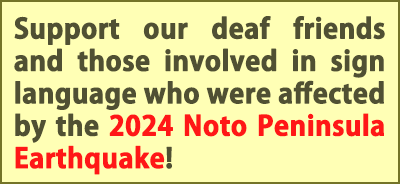International Committee of the Sports for the Deaf (ICSD, the governing body of international deaf sports and organizer of the Deaflympic Games, had its 47th congress in Italy, from December 9th through 11th, 2019. The Congress elected Mr. Kang Chen(陳康)from Taiwan for the new president of ICSD. Mr. Chen is the first ICSD president from Asia.
– The 47th ICSD Congress was held (Italy, December 9th and 11th, 2019) (Japanese)
With an aim to discuss ICSD reform as well as to strengthen the relationship between the Japanese Federation of the Deaf (JFD) and ICSD, JFD invited Mr. Chen and the CEO, Mr. Dmitry Rebrov to Japan from January 20 through January 23, 2020. Mr. Chen has successfully led 2009 Summer Deaflympic Games in Asia, held in Taipei, Taiwan, while the deaf sports has been historically initiated by European countries. JFD is determined to be committed to the further development of deaf sport, by working with the ICSD and the chairperson of the ICSD Reform Committee.


